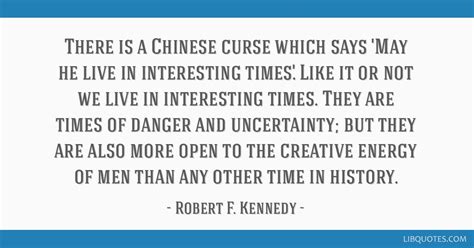THE CURSE OF LIVING IN INTERESTING TIMES
“There is a Chinese curse which says, ‘May he live in interesting times.’ Like it or not, we live in interesting times. They are times of danger and uncertainty; but they are also the most creative of any time in the history of mankind.”
Robert F. Kennedy
“Day of Affirmation Address”
Capetown, South Africa, 1966[1]
“The West’s Kabul moment, unlike the Fall of Saigon in 1975 or Jimmy Carter’s Tehran hostage crisis in 1979, scenes of previous humiliations, is no false alarm. There will be no bounce-back, no miraculous renaissance: this time the North American-European-Australasian model really is in trouble, as the next stage of the 21st century’s great geopolitical and civilizational realignment begins in earnest.”
Allister Heath[2]
“But Xi [Chinese President Xi Jinping] has overplayed his hand. The level of technology theft and penetration of U.S. institutions has become intolerable—not to mention China’s decision to snuff out democracy in Hong Kong, to wipe out Uygur Muslim culture in western China and to use its economic power and wolf warrior diplomats to intimidate neighbors like Australia from even asking for a proper investigation into the origins of the novel coronavirus in Wuhan. Xi is turning the whole western world against China …”
Thomas Friedman
New York Times editorial
Sep. 7, 2021[3]
These are interesting times indeed: a worsening pandemic (we are now at a Mu variant); a bungled foreign policy withdrawal from Afghanistan; an increasingly incoherent American president; sweeping executive orders mandating at least 100 million Americans get jabbed or lose their jobs (I’ve been vaccinated but what about those who have legitimate reasons for not taking the still experimental vaccines—such as pregnant women or those wanting to become pregnant? This is pure government overreach; I agree with one of my favorite columnists: “No government has the right to try to put something into your body by force.”[4] What comes next?); saber-rattling in and over the Taiwan Straits; massive closures of private businesses and material shortages in the United States; the retreat of elites into the metaverse and age-enhancing research; space travel; spiraling urban street and ethnic violence; natural disasters; daily new discoveries in medicine and technology; and, an exponentially growing national (and global) debt.
And that’s just the tip of the iceberg.
Each of you could add to the list.
In this vein, I was interested in an opinion piece appearing a few days ago in a British newspaper, The Telegraph. Written by French-born British journalist Allister Heath, the bottom line of the piece rests on a simple, but profound, proposition: “The West’s 320-year hegemony, which began when English GDP per capita finally overtook that of China’s Yangtze Delta in about 1700, is over.”[5]
Over?
Just like that?
Hold on a second. Weren’t scholars telling us the same thing about the Japanese industrial-wealth tsunami that was going to sweep over—and bury—the West in the 1980s? (In particular, I’m referring to a viewpoint that prevailed after American sociologist Ezra Vogel’s popular and influential book Japan as Number One).[6]
What is different this time around?
For those of you who read my missive on reassessing twelve assumptions (my take on what would happen in the next 15-20 years for my Christian fiction trilogy set in the near future), you may recall my third assumption: “The gravity of global political and economic strategy will shift away from the Western democracies resulting in profound changes by 2030, especially if the U.S. political, economic, military and legal leverage around the globe continues to wane.”
I wrote that sentence well over a decade ago.
Even then, it was hardly a new or novel idea.
But today, we are seeing that shift happen in real time.
Allister Heath’s version of this “shift” trajectory takes the form of “at least four megatrends” which he contends are breaking the West’s grip on the world.
The first megatrend, in Heath’s view, is the global emergence of non-democratic capitalism. In recent years (especially after the fall of the Soviet Union) there was an assumption that Western-style capitalism would prevail throughout the world.[7] But, as Heath contends, this viewpoint is based on a series of erroneous assumptions, primarily a growing denial of the West’s particular Jewish and Christian role in its institutions and history.[8] Of course, there is also the narcissistic, arrogant, ahistorical downplaying of other traditions by the West as well as the faulty premise that adopting capitalism by a society automatically leads to a steady increase in individual liberties. But, as Heath warns, “the Western model can be disaggregated, as the Chinese have proved,” and that “capitalism can easily coexist with tyranny.” In short, “free markets don’t imply free speech.” Heath sees it likely that the future for my grandchildren will be defined by a range of clashing civilizational models.[9] (As some of you will recall, in a previous missive I asked if the global brain—or “hive mind”—that the techno-algorithmic elites appear determined to push us toward, will think in Western or Chinese perceptual terms).
We could probably spend the better part of a college semester unpackaging the fuller implications of this first megatrend alone.
But there is more.
The second megatrend cited by Heath is the misuse of technology, which he sees as ushering in a “great paradigm shift.” Heath points to social media in particular as having a “catastrophic corrosive effect on attention spans, the quality of public discourse and the ability to think freely.” Moreover, it has “dramatically exacerbated tribalism and extremism.” “When all currency is digital, dictators can track, control, tax and confiscate as they please.” If one combines that with recent advances in facial recognition, the possible outcomes become “nightmarish.” In Heath’s view, authoritarian states will become ever harder to overthrow, further tipping the global balance of power in their favor. Such nation-states now have more tools than ever before at their disposal to control their populations. What does Heath see coming to the West in his crystal ball? A Chinese-style social credit system (most likely in the guise of fighting obesity or saving the planet).[10]
Third, is the net zero revolution.[11] In Heath’s view, “the West is no longer putting economic growth first, while the emerging empires are still desperate to get rich.” In some respects, according to Heath, the net zero concept is based on a faulty premise—”poorer countries will suffer greater harm from climate change than wealthier nations.” The net zero agenda also provides a convenient cover: “China’s real agenda is to pick up new, clean technologies developed at great cost in the West on the cheap, allowing them to leap-frog America and Europe without crippling its own economy.” Moreover, “by bolstering the importance of the rare earth minerals such as lithium and cobalt required for new technologies, net zero will give China a dramatic boost.” This has become an inconvenient truth for many net zero supporters.[12] (By the way, Afghanistan has plentiful natural supplies and China is moving in).
The fourth megatrend cited by Heath is America’s and Europe’s ideological decadence. In short, we are turning our backs on the values that made us great. Indeed, “many would rather see mob rule than the rule of law.” Heath suggests there is a growing skepticism about reason and pursuit of truth, and universities are now putting identity politics before knowledge. In another area, “we are even seeing a resurgence of neo-Lysenkoism, whereby politics trumps science.” Moreover, in Heath’s view, “woke ideology is the greatest threat to freedom since communism.” Finally, “as Afghanistan burns, the rest of the world is looking on and laughing at our stupidity.”[13]
I think this laughter can be heard the loudest in Beijing’s halls of power.
Heath’s article eloquently sums up the “glass-half-empty” view of today’s world in general, and the decline of the West in particular. Many others are saying much the same thing. At least one other ingredient perhaps needs to be added to this heady brew: the total absence of leadership qualities and integrity among today’s political, economic, judicial and religious leaders in the West—just when we need it most.
I’d like to add a final note on this section. I’ve really heard no meaningful discussion on this aspect of the decline of the West. (That is not to say it isn’t out there somewhere lurking in cyberland). I join with some of my friends on a weekly basis to play on-line pinochle. The computer program makes almost all the decisions for us except for bidding and what card to lead. A couple weeks ago, one of the players tipped his partner that he had a lot of melt (count). That made a huge difference in how the hand was bid out. That is a definite “no-no”: it isn’t written down anywhere, there is no hard-and-fast rule against it, it is a violation of card etiquette that we learned as a kid. No doubt the player who did it—an excellent card player in every respect—felt justified in his action.
What is my point? In the geostrategic arena there is also an unwritten code of behavior that has governed nation-to-nation relations for the last three centuries. Everybody playing in that arena knows the rules of the game—both written and implied. It is an order established by Western cultural interactions, laws, and a respect for the intrinsic (God-covenented) value of individuals. As one of many examples, the West plays by a different manual for waging war: “These days, when U.S. military leaders are contemplating an action, military lawyers decide whether it comports with humanitarian law. Sometimes the restraint is extreme; in 2010, the rules for air strikes in Afghanistan, tightened by General Stanley McChrystal, were so restrictive that troops complained that they were being put at risk.”[14]
Chinese commanders, it can be assumed, will be under no such constraints.
My point: In today’s world, the West’s unwritten code is dissipating and with it will come a cascading series of unintended consequences.
The primary beneficiary of this deterioration of the West—Heath’s shift—has always been assumed to be China.
So, do we bend over, grab our ankles, throw in the towel and hand over the mantle of global leadership to the Chinese—the presumptive heir of the West’s demise?
As coach Lee Corso is fond of saying on the Saturday morning college football preview show: “Not so fast my friend.”
Although it doesn’t seem like it on the surface, China has its own set of problems. From a superficial glance, it appears Chinese President Xi Jinping (in power since 2012) holds all the cards. As we speak, he is orchestrating the sorts of party controls reminiscent of pre-reform (Mao-era) days, which some have labeled a “great leap backwards” or a “Second Cultural Revolution.” The campaign aspires to correct moral values and promote patriotism.[15] Xi’s widely publicized “common prosperity” campaign, for example, has rattled both his political opponents and an emerging domestic class of high-tech billionaires.[16] In recent weeks, a slew of regulatory overhauls by Chinese authorities have come for e-commerce, social media (Chinese internet regulators have banned 1,793 “self-media accounts” since late August), the $100 billion private education industry (especially affecting foreigners teaching English), artists, celebrities and reality television, as well as affecting wealthy individuals like Alibaba’s Jack Ma and actor Vicki Zhao.[17] China’s internet giants are being pressured to crack down on “sissyness” (niangpao) and homosexuality, “Xi Jinping Thought” is now being taught in Chinese elementary schools,[18] and Xi’s portrait has replaced the picture of Christ in government approved churches. Foreign video games and apps are being pulled from shelves. In August, a state media commentary called video games “spiritual opium,” which it said had “a negative impact on the physical and mental health of minors.” Weeks later, the Chinese government barred minors from playing online games on school days; they are only allowed an hour of play time between 8 p.m. and 9 p.m., on Friday, weekends and public holidays.[19]
Xi’s campaign is also decidedly anti-Western. Stoking the flames of fervent Chinese nationalism and patriotism is a major part of the campaign. As one veteran China watcher has pointed out, the increasing antagonism between China and the West has led to a new wave of surging nationalism within China. “Increasingly, we are seeing—both inside and outside China—the forming of the narrative ‘China vs. the West’. The longer the standoff persists, the more likely Beijing is to emphasize its uniqueness in comparison to the West, or to other Asian countries.”[20]
On the flip side, while Xi’s crusade has left the country’s previously all-powerful tech titans, such as Alibaba’s Jack Ma and Tencent’s Pony Ma, in no doubt about who controls China’s future, it has also alarmed investors. Indeed, the fallout from the new regulations has wiped more than $1 trillion from Chinese tech stocks since a peak in February. To put a band-aid on the hemorrhaging, Chinese officials over the past few days have scrambled to restore investor confidence: Vice Premier Liu He promised during a forum on Monday in Hebei province that China’s support for the private economy “has not changed and will not change in the future.” On Tuesday, the People’s Daily—in an unprecedented about-face move—ran a front-page article pledging the government’s “unswerving commitment” to the private sector and protecting foreign capital and competition.[21]
At the same time, Xi’s strong-armed approach to pushing such changes may not be easy in today’s China, where decades-long economic opening and societal transformation have upended traditional norms and rewritten parts of the unspoken social contract between the rulers and the ruled. “In this process, rules are challenged, negotiated and sometimes consolidated, but they are very much a two-way street,” Dr. Hongwei Bao asserts. “The authorities cannot determine everything in today’s China. Time has changed. Things don’t always stay the same and people never give up on their hopes.”[22]
Moreover, at China’s national congress next fall, although Xi is expected to retain his title as general secretary of the ruling Chinese Communist Party (CCP), such a move upsets a decades-old system of term limits and leadership succession. Leaders at the top of the party apparatus have grown accustomed—if not feeling entitled—to their turn at the trough. They cannot be happy.
These are interesting times in China as well.
So, what about a contrarian view to all this.
Let’s call it the glass-half-full viewpoint.
Not many of my missives, quite honestly, are rooted in this perspective.
But I love talking to people—especially those who read and comment on my missives—who are incurable optimists.
Where I see the world about to come apart at the seams, or a Sino-US rivalry leading to war, or technology falling increasingly into the hands of self-serving high-tech titans, or an evil agenda behind the pandemic, or a church that has closed its eyes to life, traditional views of marriage and individual liberty, my friends look at basically the same fact patterns and arrive at the exact opposite conclusion.
Things will get better not worse, major political changes are coming with the upcoming elections, new cures will be found to keep the Greek alphabet-soup of COVID variants in their place, our devastated economy will recover, and we are on the threshold of major technological breakthroughs that will improve the quality of life for everyone.
Many of these optimists also see a future revival sweeping America to take us out of our moral freefall.
On the other hand, one of my favorite black swan-type projections deals with a future revival in China, where some observers estimate that within three decades there could be as many as 400 million Christians[23] (today China officially acknowledges 44 million Christians, but that number probably doesn’t count an estimated 22 million worshipping in underground churches). No one—at least that I’m aware of—is predicting the social implications for China if those estimates are anywhere close to correct.
Indeed, but God …
“Sigh.”
For my part, I hope the optimists are right.
[1] For his speech, Kennedy changed the original wording from “in an interesting age.” The oft-used phrase generally assumed to be a curse of ancient Chinese origin may have been actually first used by American politician Frederick R. Coudert in 1939, citing a passage in a letter sent to him by Sir Austen Chamberlain stating: “Many years ago, I learned from one of our diplomats in China that one of the principal Chinese curses heaped upon an enemy is ‘May you live in an interesting age.’” Erin Servais, “Origin of ‘May you live in interesting times,’” Grammar Party, Apr 7, 2020.
[2] Allister Heath, “Four mega-trends that condemn the West to irreversible decline,” The Telegraph, Aug 25, 2021.
[3] Friedman’s quote is remarkable because he has been painted, in some political quarters, as one of the chief apologists for the communist regime in China.
[4] Michael Snyder, “There Is No Turning Back After This,” The Economic Collapse, Sep 9, 2021.
[5] Heath, “Four mega-trends.”
[6] Ezra Vogel, Japan as Number One: Lessons for America, Harvard University Press, 1979.
[7] In my college classes I call this the Fukuyama thesis, based on books such as The End of History and the Last Man (1992) by Francis Fukuyama. The thesis argues that the worldwide spread of liberal democracies (after the fall of the U.S.S.R.) and free-market capitalism of the West and its lifestyle may signal the end point of humanity’s sociocultural evolution and become the final form of human government.
[8] For those interested in the extraordinary role Christianity has played over the centuries in the West, read Tom Holland’s Dominion: How the Christian Revolution Remade the World, New York: Basic Books, 2019.
[9] Heath, “Four mega-trends.”
[10] Ibid.
[11] The term “net zero” applies to the movement to achieve zero carbon emissions. Its proponents cite the following factors to support their position: increasing concentration of all major greenhouse gases; record high amounts of global CO2 emissions; the concentration of CO2 in the atmosphere; rising sea levels; warming trends in the Artic; and the increasing severity and intensity of weather effects. See, among others, Dan Meredith, “NET ZERO: The other industrial revolution,” themanufacturer.com, Dec 15, 2020.
[12] Heath, “Four mega-trends.”
[13] Ibid.
[14] For a fascinating argument that the American military obsession with minimizing civilian casualties has led to “forever wars” that may be counterproductive, see Dexter Filkins, “Did Making the Rules of War Better Make the World Worse?” The New Yorker, Sep 6, 2021.
[15] Vincent Ni, “China’s cultural crackdown: few areas untouched as Xi reshapes society,” The Guardian, Sep 10, 2021.
[16] See, among others, David Chao, “The winners and losers as ‘common prosperity’ reshapes China’s economy,” South China Morning Post, Sep 10, 2021.According to Chao, the term has been included in the latest earnings report of over 70 major Chinese companies and President Xi has used the term in over 60 speeches this year so far. The driver? The Deng Xiaoping era of reforms—a policy pivot toward decentralization and privatization—has led to an astonishing growth in Chinese household incomes. But it is decidedly lop-sided: the average urban income level is 2.5 times higher than the rural level and China’s Gini coefficient makes it one of the most unequal major economies in the world. Xi’s ambitious campaign seeks to promulgate socialist values, end “absolute poverty,” redistribute wealth and reduce inequalities. As of 2020, there were 1,058 billionaires in China (in U.S. 696). Some 600 million people—more than twice the total U.S. population live on about $150 per month.
[17] Ni, “China’s cultural crackdown.”
[18] Lily Kuo, “Xi Jinping’s crackdown on everything is remaking Chinese society,” The Washington Post, Sep 9, 2021.
[19] Nectar Gan and Steve George, “Under Xi Jinping, the private lives of Chinese citizens aren’t so private anymore,” cnn.com, Sep 8, 2021.
[20] Ni, “China’s cultural crackdown.”
[21] Ibid.
[22] Ibid.
[23] Antonio Weiss, “China: The Future of Christianity?” The Guardian, Aug 28, 2010.




